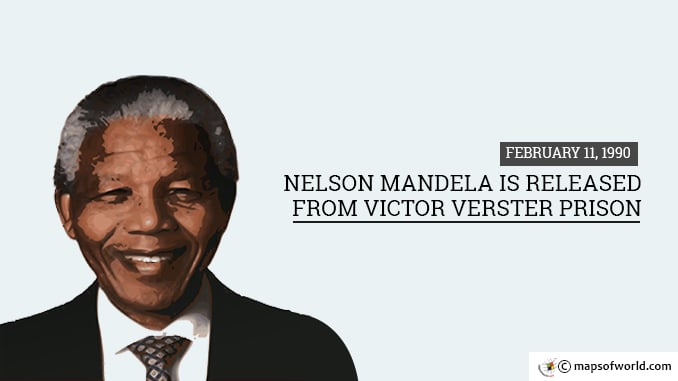On February 11, 1990, legendary South African leader Nelson Mandela was released from Victor-Verster Prison, 40 miles from Cape Town, after having spent 27 years in prison. The moment was of great significance in the history and social evolution of the country that emerged to fight a long battle against Apartheid – the social segregation of the blacks in the country. By the start of the 20th century, the challenges faced by the blacks in South Africa due to racial discrimination started to foster the Apartheid movement. In 1912, the African National Congress (ANC) was established to protect black interests and to secure universal voting rights in the nation. The Sharpeville massacre of 1960 led to the rise of a number of young leaders including Oliver Tambo, Walter Sisulu, and Nelson Mandela. Later that year, the ANC was banned and most of the young leaders were arrested. In 1961, Nelson Mandela reorganized the leaders of the now banned ANC into the radical Umkhonto we Sizwe (“Spear of the Nation”; MK). The activities of the MK included a number of acts of sabotage aimed at exerting pressure on the government. In 1962, Mandela was arrested and initially charged with inciting strikes and leaving the country without permission. Later, with the discovery of many MK activities leading up to him, Mandela and other ANC leaders were charged with sabotage and conspiracy. During the trial, Mandela delivered a three hour speech – widely considered one of his greatest. He was convicted and sentenced for life. In 1964 when Mandela was imprisoned, he disappeared from public view. With his conviction, Mandela was sent to serve his life sentence on Robben Island. He spent his time in hard labor on the island prison. The white government of South Africa did not allow any news or photos of Nelson Mandela to be circulated for fear that the masses would idolize the anti-apartheid champion. His family and fellow inmates were the only people who saw him during his confinement. This, however, only helped to heighten the mystique surrounding Mandela who became an international symbol of the anti-racial struggle in the country. Mandela was offered release many times by the de Klerk government but the offers was rejected due to the conditions attached to such a release. After 27 years, when Mandela was suddenly released on February 11, 1990, a wave of euphoria swept across the nation. As Mandela walked out of the Victor-Verster Prison in the outskirts of Cape Town (Paarl), hand-in-hand with his wife Winnie, he raised his fist in jubilation. His release was delayed by an hour and as he stepped out, dressed smartly in a brown suit, the ecstatic crowds shouted out cheers and chanted his name. Mandela boarded a silver BMW to head towards Cape Town. Hundreds of thousands of South Africans joined the street celebrations outside the City Hall. The pressing crowd slowed down Mandela’s journey to the City Hall. His first words as a free man in almost three decades were, “Comrades and fellow South Africans, I greet you all in the name of peace, democracy and freedom…Today, the majority of South Africans, black and white, recognize that apartheid has no future. It has to be ended by our decisive mass action. We have waited too long for our freedom.” The night was marked by celebrations across the country. Also, many incidents of violent clashes also were reported. In 1991, Nelson Mandela took over from Oliver Tambo as the president of the ANC. In the next two years he was awarded the Nobel Peace Prize which he shared with FW de Klerk for their efforts to bring racial equality into South Africa. The country’s first ever multi-racial elections, held in 1994, the ANC won 252 out of the 400 seats at the national assembly and Mandela became the President of South Africa. In 1999, he supported Thabo Mbeki’s candidature for Presidency but remained active in South African and international politics. In 2001 at the age of 83, Mandela was diagnosed with prostate cancer. By the time of his death in December 2013, he had been ubiquitously recognized as the architect of modern South Africa and was widely referred to by the epithet – ‘Father of the nation (South Africa)’. He was accorded a national mourning of ten days and a state funeral. Nelson Mandela’s role in leading a radical social revolution in the country, and moving forward towards a progressive economic approach are evident in the current stature of the nation as a member of the BRICS. His unyielding yet non-aggressive leadership has shaped modern South African society. You may also like : February 11 1889 – The Meiji Constitution is Adopted, Leading to the Westernization of Japan February 11 1975 – Margaret Thatcher became first woman to head a majority party in Britain
February 11 1990 – Nelson Mandela is released from Victor Verster Prison
On February 11, 1990, legendary South African leader Nelson Mandela was released from Victor-Verster Prison, 40 miles from Cape Town, after having spent 27 years in prison. The moment was…
